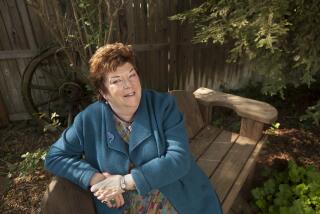Molly Ivins -- ‘a truth-seeking missile’
Atrue maverick died in Texas last week, and they don’t make ‘em extra.
There’ll always be plenty of George Bushes and John Kerrys to go around; the Crips and the Bloods will trot them out every four years whether we like it or not. But a voice in the wilderness, like the still, small voice within, is a song to be savored while we have it, whether we’re listening or not, and when we have lost it, we should mourn for ourselves. Such a voice was that of Molly Ivins.
I met her on the gangplank of Noah’s ark. I did not agree with her on a lot of things. Like Sinatra, I’ve gotten more conservative as I’ve gotten older. But not Molly. With the awkward grace of a child of our times, she clung to her ideals and notions and hopes, riding against the wind in a state as red as the blood of a dying cowboy. The word I’m looking for is “righteous.” Righteous without being self-righteous.
Molly was a truth-seeking missile. She was a devil and an angel and a spiritual chop-buster who went after anybody who got in the way of a better world. Quite often she towered above the people she wrote about. They, as likely as not, were merely the slick, lubricated heads of well-oiled political machines; she was a dreamer, a little girl lost at the county fair, who somehow grew up to be a brave and bawdy and brilliant ball-buster in a state where men have always been men and emus have always been nervous.
In an age in which the five major religions are Bank of America, Wal-Mart, McDonald’s, Kentucky Fried Chicken and Starbucks, Molly Ivins was an atheist. The New York Times, which got Herman Melville’s name wrong in his obituary, called Molly a “liberal newspaper columnist.” The Los Angeles Times said she was a “political humorist and best-selling author.” They were right, of course, but those are the words we use when we don’t know what to say.
In her dark, American heart, Molly was mostly a troublemaker in the feisty spirit of Jesus Christ, John Brown, Joe Hill and, not to be a male chauvinist or needlessly alliterative, Joan of Arc and Josephine Baker. Two, and possibly three, among this esteemed and reviled assemblage spent time in France. Molly studied in Paris. I do not like France. I do not know what Molly thought of that country. I know she loved this one.
It is, however, the sacred duty of the troublemaker to stir the putrid pot of humanity every now and again, to make people see that there is something more important than political correctness and that is moral correctness, and to challenge the prayers and the promises of the heartbroken land she loved. And she did it mostly with wit and humor, the kind of humor that sailed dangerously close to the truth without sinking the ship. There are two kinds of sailors, they say: the sailor who fights the sea and the sailor who loves the sea. Molly loved the sea.
I loved Molly because she would say things nobody else had the cojones to say, always in a funny and charming Texas way, of course. Imagine a big, brazen cowgirl walking up and saying, “That boy’s jeans are on so tight, if he farted he’d blow his boots off.”
My dad, Tom, was a World War II hero, and Molly had long been one of his heroes, though he had never met her. After he had a heart attack, Molly showed up on our doorstep one afternoon just to visit with him. Molly lifted his spirits and her gesture touched him deeply, as it did his son.
Finally, Molly gave me the greatest slogan I had in my recent campaign for governor of Texas. The slogan was, “Why the hell not?” Why the hell not, indeed. In this homogenized, trivialized, sanitized world, she stands as a lighthouse not just to the left but to us all. Peace be with you, Molly.
More to Read
Sign up for Essential California
The most important California stories and recommendations in your inbox every morning.
You may occasionally receive promotional content from the Los Angeles Times.










